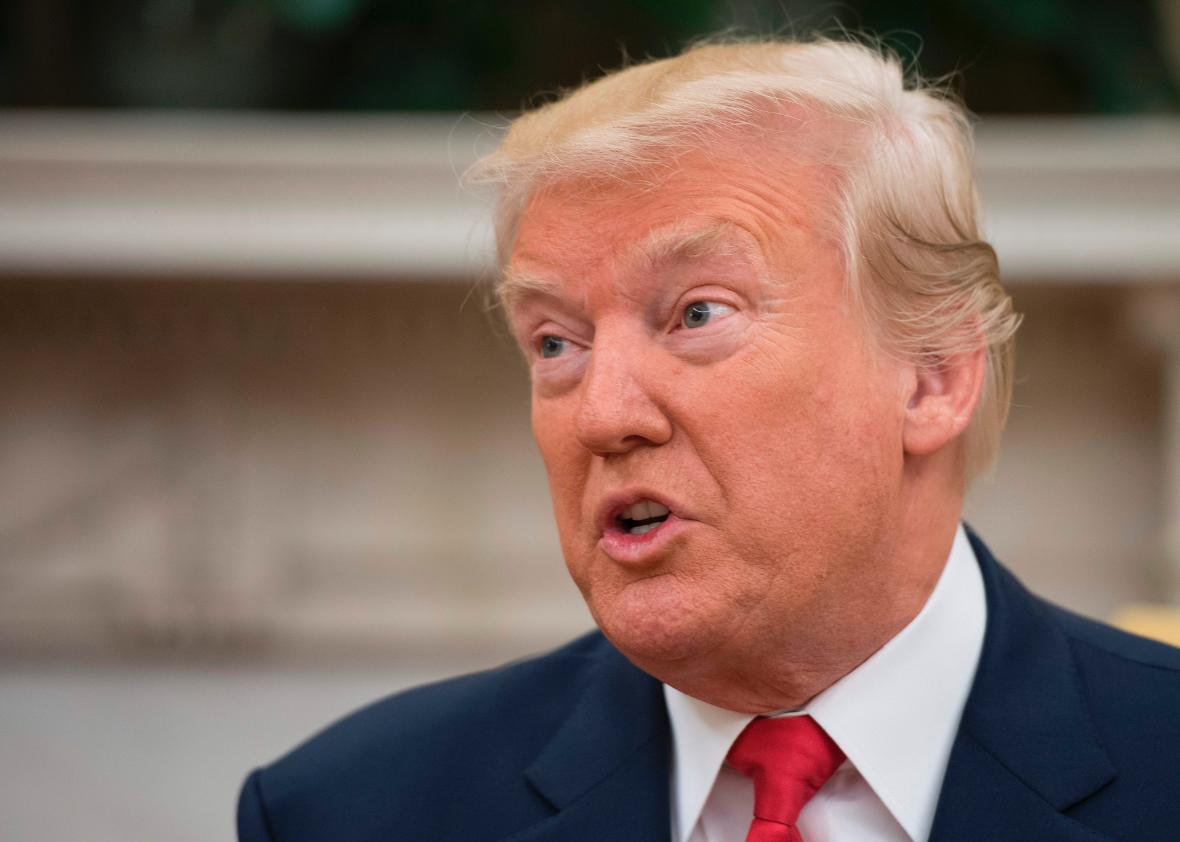President Donald Trump blocks a lot of people on Twitter. Is that constitutional? Seven blocked users are suing to find out, and they may have a case. The First Amendment generally bars public officials from punishing individuals on the basis of viewpoint, so a key question is whether @realDonaldTrump blocks users for criticizing him—or simply because they are harassing, spamming, or threatening him. So it is really quite shocking that, on Monday, Trump’s lawyers handed the plaintiffs a huge concession, stipulating in court filings that Trump blocked them because they “criticized the President or his policies.”
In one sense, these lawyers may have had little choice but to admit the truth. The Knight First Amendment Institute at Columbia University, which represents the plaintiffs, has uncovered the tweets that spurred Trump to block each user. All contain pretty mild criticism. One user, Philip N. Cohen, replied to a @realDonaldTrump tweet with the statement: “Corrupt Incompetent Authoritarian. And then there are the policies. Resist.” Another, Eugene Gu, tweeted at Trump, “Covfefe: The same guy who doesn’t proofread his Twitter handles the nuclear button.” And Nick Jack Pappas replied to Trump’s infamous travel ban tweet in June with this burn: “Trump is right. The government should protect the people. That’s why the courts are protecting us from him.” This quintessential political expression receives robust protection under the First Amendment.
And yet, through their unexpected candor, Trump’s lawyers may have inadvertently stipulated themselves into defeat. As Jameel Jaffer, executive director of the Knight Institute, put it, “The White House’s concessions here amount to an acknowledgment that the president and his aides have engaged in viewpoint discrimination in violation of the First Amendment.” Trump’s lawyers now must argue that Trump is constitutionally entitled to engage in viewpoint discrimination on Twitter, either because @realDonaldTrump is a putative personal account, or because the usual rules don’t apply to social media.
This first argument is clearly dead in the water: While Trump’s presidential twitter handle is technically @POTUS, he has used @realDonaldTrump for actual policy-making, including the announcement of his trans troops ban. The handle may have initially been an outlet for Trump’s private views, but as president he has exploited it as forum for governance. It would thus seem that all individuals should have equal access to his feed as well as the ability to respond critically to his tweets.
The second argument—that constitutional free speech principles should not apply on public officials’ social media accounts—is stronger but still dubious. In July, a federal judge ruled against a public official who had blocked a constituent on Facebook for criticizing her. The official asserted that this consistent could have expressed his ire through myriad other forums, but the judge firmly rejected this rejoinder. By blocking a constituent, he explained, the official had prevented him from commenting directly on Facebook posts; this “suppression of critical commentary” constitutes “a cardinal sin under the First Amendment.” In one critical passage, the judge asserted:
The Court cannot treat a First Amendment violation in this vital, developing forum differently than it would elsewhere simply because technology has made it easier to find alternative channels through which to disseminate one’s message.
This logic is extremely persuasive in light of the Supreme Court’s recent declaration that social media may now be “the most important” modern forum “for the exchange of views,” including petitioning of “elected representatives.” Presuming it is correct, the same reasoning would seem to apply to @realDonaldTrump. By blocking users, Trump prevents them from engaging directly with his tweets, a potentially impermissible burden on political speech.
The Knight Institute’s lawsuit is not a sure bet. It asks the courts to extend old rules to new mediums, something judges, luddite and otherwise, are often hesitant to do. But basic First Amendment principles would seem to suggest that Trump is constitutionally proscribed from blocking users because they criticized him. That is the issue at the heart of this case, and Trump’s lawyers just stipulated it away.
